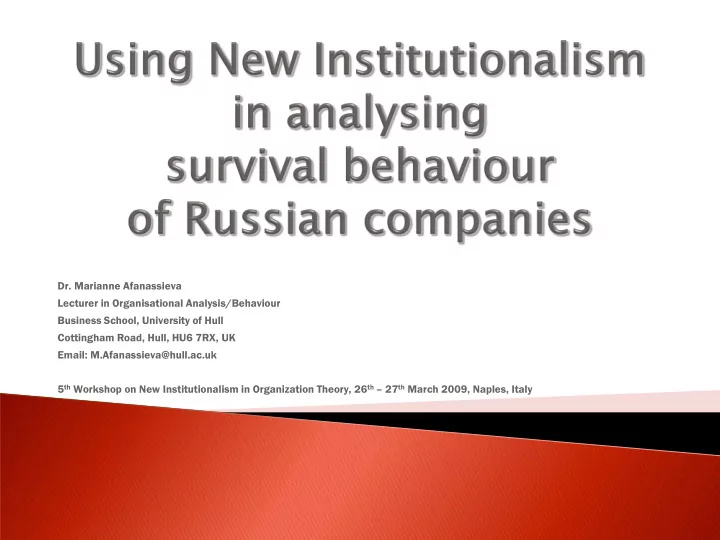

Dr. Marianne Afanassieva Lecturer in Organisational Analysis/Behaviour Business School, University of Hull Cottingham Road, Hull, HU6 7RX, UK Email: M.Afanassieva@hull.ac.uk 5 th Workshop on New Institutionalism in Organization Theory, 26 th – 27 th March 2009, Naples, Italy
Russian enterprises restructured – a result of post-Soviet market reforms: ◦ unbundling profitable from non-profitable aspects (Blanchard et al., 1994; Aghion and Blanchard, 1994; Carlin et al., 1994) Defence enterprises – a different case: ◦ Production shops shrunk and / or frozen – not closed
Inconsistent and changing legislation (Levin and Satarov, 2000; Aouzan, 2005) Problems complying with the law (Leitzel, 1997; Prokhorov, 2002) „Rules of the game‟ - not transparent (Ledeneva, 2006)
krugo gova vaya ya poruka (ties of joint responsibility) in professional circles dvoin inay aya a bukhga galte lteriy iya (keeping two sets of accounts) and financial scheming tenevoi voi bart rter (shadow barter) barter chains, and nonmonetary markets alternative enforcement and selective use of law (Ledeneva, 2006)
Misztal‟s (1996: 9) conceptualisation : “a social mechanism which can be explained by people‟s beliefs and motivations” is rooted in social relations and the obligations inherent in them is linked to uncertainty about other people‟s motivations
Low compared to Western Europe (Mishler and Rose, 1998; Rose, 1998) Networks of personal connections or informal social networks - necessary components of a survival mechanism in Russia (Rose, 1998) The stock of social capital is low in Russia Exclusionary nature of social capital in Russia (closer to Bourdieu,1986, rather than to Putnam et al., 1993)
serving as channels of confidential information forming business reputations establishing trust and decreasing uncertainty providing systems of mutual assistance arranging barter exchanges and mutual offsets (Radaev, 2002: 69)
Examines the conditions that the enterprises being considered have faced since the beginning of transition Applies New Economic Sociology‟s concepts of network, embeddedness and social capital to the case of the studied companies, identifying „new‟ and „old‟ types of networks Applies relevant concepts from the New Institutionalism in Organisational Analysis Conclusion
From 1995-2000: semi-structur tructured d interv rvie iews ws with directors and heads of relevant departments at four defence enterprises in one Russian region ( oblast‟ ): Russ ssia ian n newspape pers rs – nation onal l and local Chambe ber r of Commerce and Industr stry - nation onal l and local Beyond December 2000: report rts in Russia ian newspapers rs (local l and nationa onal) l) company ny websites Company A and Company C – privatised; Enterprise B and Enterprise D - state-owned
Double uble press ssure ure : Transition from planned economy to market economy Conversion from military to civilian production http://www.un.org/russian/images/tour-12.gif
„old‟ „new‟
… these are an extension of what Raiser calls: “ networks based on existing ties between the previous members of the communist nomenclatura – recombined during the transition to accommodate the reorganisation of the enterprise sector through corporatisation and privatisation, but continuing to be built primarily on process-based trust” (Raiser, 1999: 8). www.transtour-odessa. com/gallery/main.php/d/ 5394-2/krasnaya_ploschad.jpg
http://www.procurementserviceprovider.com/images/supply_chain.jpg
Source: van Norman Baer, 1991: 140
Company A ◦ „new‟ networks - successful development of ◦ „old‟ networks - maintained and developed Enterprise B ◦ „old‟ networks - successful use of ◦ „new‟ networks - no perceived necessity to develop Company C ◦ „old‟ networks - survival based on ◦ „new‟ networks - failed to develop them Enterprise D ◦ „old‟ networks - difficulty maintaining and developing ◦ „new‟ networks - difficulty initiating
Two types of networks identified - „old‟ and „new‟ Dual and contradictory effect of closed networks: ◦ survival mechanism - effective ◦ growth and innovation – constrained
Past and present Soviet and post-Soviet Military and civilian Maintain and initiate Grow and stagnate Survival and ……….. Left: Man, designed by Vladimir Stenberg and Georgii Stenberg for a character in the operetta Day and Night , 1926 (source: van Norman Baer, 1991: 114)
Aghion, P., and Blanchard, O. (1994) 'On the speed of transition in Eastern Europe', NBER Macroeconomics Annual . Aouzan, A. A. (2005) Institutsional'naya Ekonomika: Novaya Institutsional'naya Ekonomicheskaya Teoriya , Moscow: INFRA-M. Blanchard, O. J., Froot, K. A., and Sachs, J. D. (Eds.) (1994) The Transition in Eastern Europe. Volume 2: Restructuring , Chicago and London: The University of Chicago Press. Bourdieu, P. (1986) 'The forms of capital', in J. G. Richardson (Ed.), Handbook of Theory and Research for the Sociology of Education , Westport: Greenwood. Carlin, W., van Reenen, J., and Wolfe, T. (1994) 'Enterprise restructuring in the transition: an analystical survey of the case study evidence from central and eastern Europe', EBRD Working Paper No.14 . Ledeneva, A. V. (2006) How Russia Really Works: The Informal Practices That Shaped Post-Soviet Politics and Business , Ithaca and London: Cornell University Press. Leitzel, J. (1997) 'Rule evasion in transitional Russia', in J. M. Nelson, C. Tilly, and L. Walker (Eds.), Transforming Post-Communist Political Economies , Washington, D.C.: National Academy Press. Levin, M., and Satarov, G. (2000) 'Corruption and institutions in Russia', European Journal of Political Economy , 16, 2: 113-132. Mishler, W., and Rose, R. (1998) 'Trust in untrustworthy institutions: culture and institutional performance in post-Communist societies', University of Strathclyde Centre for the Study of Public Policy, Studies in Public Policy No. 310 . Misztal, B. A. (1996) Trust in Modern Societies: The Search for the Bases of Social Order , Cambridge: Polity Press. Prokhorov, A. P. (2002) Russkaya Model Upravleniya , Moscow: Zhurnal Ekspert. Putnam, R. D., Leonardi, R., and Nanetti, R. Y. (1993) Making Democracy Work: Civic Traditions in Modern Italy , Princeton: Princeton University Press. Radaev, V. (2002) 'Entrepreneurial strategies and the structure of transaction costs in Russian business', Problems of Economic Transition , 44, 12: 57-84. Rose, R. (1998) 'Getting things done in an anti-modern society: social capital networks in Russia', World Bank Social Capital Initiative Working Paper , No. 6. van Norman Baer, N. (1991) Theatre in Revolution: Russian Avant-Garde Stage Design 1913-1935 , London: Thames and Hudson.
Recommend
More recommend